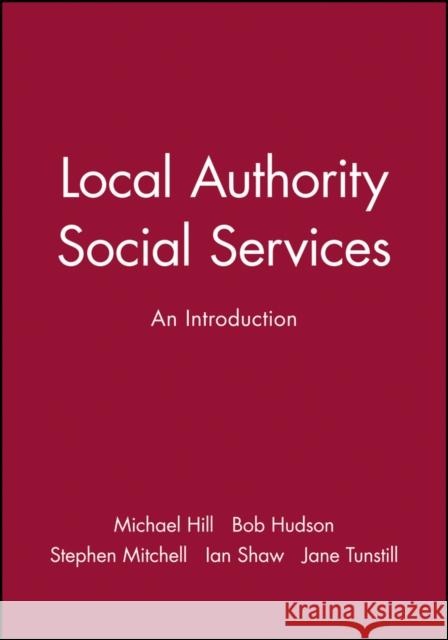Local Authrty Soc Services » książka



Local Authrty Soc Services
ISBN-13: 9780631209461 / Angielski / Twarda / 2000 / 240 str.
Local Authrty Soc Services
ISBN-13: 9780631209461 / Angielski / Twarda / 2000 / 240 str.
(netto: 483,87 VAT: 5%)
Najniższa cena z 30 dni: 503,91
ok. 30 dni roboczych.
Darmowa dostawa!
This new text provides readers with a comprehensive introduction to Local Authority Social Services, the main context in which UK social work is practised .
"The writing is accessible, well balanced and up to date student texts is a difficult task, of which in the field of social policy Michael Hill is the incomparable past–master. Here he has spotted a gap in the market, the lack of a book covering all the manifold and rather baggy activities performed by local authority social service departments...this is a timely book."
––
Tony Rees, University of Southampton
"The strength of this book lies in the quality of analysis and its ability to capture and discuss critically the impact of the government′s modernization agenda. It should have a place in all departmental libraries."
–– Terry Bamford, Community Care
"This book is unique in providing a clear framework for understanding the relationship between social policy and social services, and the complex structures and roles of the different organizations involved in the operation of social services ... It is one of the few texts that provide a clear picture of how to make sense of the bureaucratic organizational structures that surround social services ... in all the book is an important text for the social worker or student in understanding the relationship between social services, local authority and the central state." (Journal of Social Work)
List of Figures.
List of Tables.
List of Contributors.
Preface.
Acknowledgements.
Part I: Establishing the Main Concerns of the Book.
1. What are Local Authority Social Services? (Michael Hill).
Introduction.
Social Services Work.
Social Services and Other Areas of Social Policy.
Social Services and Health.
Social Services as Last Resort Services.
Conclusions.
2. Origins of the Local Authority Social Services (Michael Hill).
Introduction.
Personal Social Services before 1948.
Developments in the 1940s.
1948 to 1971.
1971 to 1990.
Conclusions.
3. The Contemporary Social Framework (Michael Hill).
Introduction.
The Basic Demographic Picture.
More Complex Demographic Issues.
Economic Stresses and Strains.
Ill health and Disability.
Conclusions: Social Pathology and Social Services.
Part II: The Local Authority Social Services Task.
4. Child Care (Jane Tunstill).
Introduction.
A Brief Historical Perspective on Social Services Provision for Children.
The Legal and Administrative Framework.
Services and Settings.
Key Service Issues.
The Role of Training.
Conclusions.
5. Adult Care (Bob Hudson).
Introduction.
Services for Older People.
Services for People with a Learning Disability.
Services for Physically Disabled People.
Conclusions.
6. Mental Health (Ian Shaw).
Introduction.
Mental Illness and the New Community Care.
Mental Health and Social Work.
Problems with Community Care.
Managing Dangerousness.
Conclusions.
7. Social Services and Social Security (Michael Hill).
Introduction.
Cash and Care in the Years after the End of the Poor Law: an Evolving Relationship.
Cash Benefits and Welfare Rights.
The Welfare Responsibilities and Concerns of Social Security Agencies.
The Impact of the 1986 Social Security Act.
Disability, Community Care and Local Authority Means–Testing.
Conclusions.
Part III: Organization: Present and Future:.
8. The Central and Local Government Framework (Michael Hill).
Introduction.
The Role of the Department of Health.
The Audit Commission.
The Local Government Context.
The Collective Representation of Local Authorities.
Local Government Finance and the Social Services Function.
Policy Making in Local Government.
Organizational Issues about Health Service Collaboration.
Conclusions.
9. Organization within Local Authorities (Michael Hill).
Introduction.
The Organization of Social Services: The Model after Seebohm.
Elaborating the Model: Preoccupations in the 1970s and 1980s.
The ′Big Bang′ of the 1990s – Community Care and the Children Act.
Contemporary Models of Social Services Organization.
Staffing of Social Services Authorities.
Conclusions.
10. Modernizing Social Services: The Management Challenge of the 1998 Social Services White Paper (Stephen Mitchell).
Introduction.
Background: the 1997 Inheritance.
Why Modernize?.
Modernizing Adult Services.
Modernizing Children′s Services.
Strengthening Regulation of Services and the Workforce.
Improving Performance.
Conclusion: The Key Challenges.
11. Conclusions: The Future of Local Authority Social Services (Michael Hill).
References.
Index.
Michael Hill is currently Visiting Professor at Goldsmiths College, University of London. He was previously Professor of Social Policy at the University of Newcastle upon Tyne. He is joint editor of the
Journal of Social Policy and the author of numerous books including
Social Policy: A Comparative Analysis (1995) and
Understanding Social Policy (6th edition, 2000).
The other contributors are Bob Hudson, Principle Research Fellow in the Community Care Division at the Nuffield Institute of Health at the University of Leeds.
Stephen Mitchell, Head of the General Social Services Policy Branch in the Department of Health.
Ian Shaw, Lecturer in Social Policy at the University of Nottingham.
Jane Tunstill, Professor of Social Work at Royal Holloway College, University of London.
This new textbook provides readers with a comprehensive introduction to the main context in which social work is practiced – Local Authority Social Services. It is based on the realities of work in a modern social services authority and is written by an author team which combines teaching and writing expertise with the experience of working in the social services.
The book covers all the local authority personal social services and the frameworks within which they operate. It addresses the major changes that have taken place in the social services in recent years and looks forward to prospects for personal social services in the future.
1997-2026 DolnySlask.com Agencja Internetowa
KrainaKsiazek.PL - Księgarnia Internetowa









